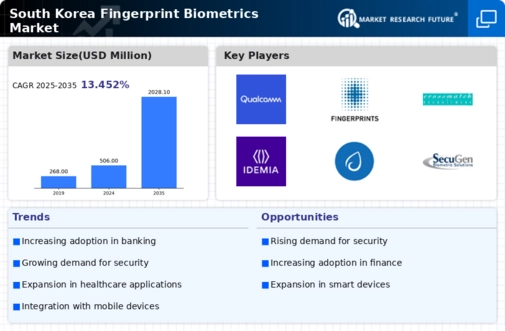Rising Concerns Over Data Privacy
Rising concerns over data privacy are significantly influencing the fingerprint biometrics market. In South Korea, consumers are increasingly aware of the implications of data breaches and identity theft, prompting a demand for more secure authentication methods. The government has implemented stringent data protection regulations, which compel organizations to adopt advanced biometric solutions to safeguard personal information. This regulatory environment is expected to drive the market growth, as businesses seek to comply with legal requirements while enhancing customer trust. The fingerprint biometrics market is projected to grow by 15% in the next few years, driven by the need for secure data handling practices. Organizations that prioritize data privacy through biometric authentication are likely to gain a competitive edge, as consumers gravitate towards brands that demonstrate a commitment to protecting their information.
Increasing Demand for Secure Transactions
The fingerprint biometrics market is experiencing a notable surge in demand for secure transaction methods, particularly in the financial sector. As consumers become more aware of security threats, the need for reliable authentication systems has intensified. In South Korea, the financial services industry is projected to invest approximately $1.5 billion in biometric technologies by 2026, indicating a robust growth trajectory. This investment is driven by the necessity to protect sensitive financial data and enhance user trust. Consequently, financial institutions are increasingly adopting fingerprint biometrics to streamline customer verification processes, thereby fostering a more secure banking environment. The integration of these technologies not only mitigates fraud risks but also aligns with the evolving regulatory landscape that emphasizes stringent security measures. Thus, the increasing demand for secure transactions is a pivotal driver for the fingerprint biometrics market.
Government Support for Biometric Initiatives
Government support for biometric initiatives is a significant driver of the fingerprint biometrics market. In South Korea, the government has recognized the potential of biometric technologies in enhancing national security and public safety. Initiatives aimed at integrating biometric systems into various sectors, such as law enforcement and border control, are gaining momentum. The fingerprint biometrics market is expected to benefit from government funding and policy support, which may reach approximately $500 million by 2027. This financial backing is likely to accelerate the development and deployment of biometric solutions across public services. Furthermore, government-led awareness campaigns are fostering public acceptance of biometric technologies, thereby driving adoption rates. As the government continues to champion biometric initiatives, the fingerprint biometrics market is poised for substantial growth.
Expansion of Smart Devices and IoT Integration
The expansion of smart devices and the integration of Internet of Things (IoT) technology are pivotal factors propelling the fingerprint biometrics market. In South Korea, the proliferation of smart home devices and wearables has created a demand for secure access control solutions. As more consumers adopt smart technology, the need for seamless and secure authentication methods becomes paramount. The fingerprint biometrics market is anticipated to grow by 10% annually, driven by the increasing incorporation of biometric systems in smart devices. This trend not only enhances user convenience but also addresses security concerns associated with IoT devices. Manufacturers are increasingly embedding fingerprint sensors in smartphones, tablets, and smart locks, thereby expanding the application scope of biometric technology. The convergence of smart devices and biometric authentication is likely to redefine user experiences and drive market growth.
Technological Advancements in Biometric Systems
Technological advancements play a crucial role in shaping the fingerprint biometrics market. Innovations in sensor technology, algorithms, and data processing capabilities have significantly enhanced the accuracy and speed of fingerprint recognition systems. In South Korea, the market is witnessing a shift towards more sophisticated biometric solutions, with a projected growth rate of 12% annually over the next five years. These advancements enable the development of compact and cost-effective fingerprint scanners, making them more accessible to various sectors, including retail, healthcare, and government. Furthermore, the integration of artificial intelligence and machine learning into biometric systems is expected to improve the reliability of fingerprint recognition, thereby increasing user adoption. As technology continues to evolve, the fingerprint biometrics market is likely to benefit from enhanced performance and broader application across diverse industries.
















